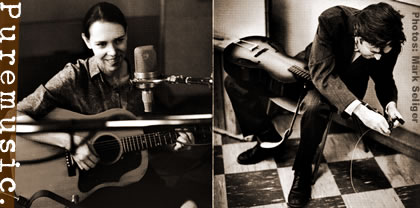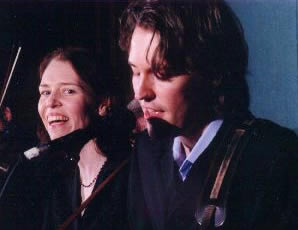
The Ghostly
Ones (continued)
When school was over, Welch said, "I looked at my record collection and saw that all the music I loved had been made in Nashville--Bill Monroe, Dylan, the Stanley Brothers, Neil Young--so I moved there. Not ever thinking I was thirty years too late." At the end of the summer, Rawlings moved to Nashville, too. In Boston, when they played together, they were always among other musicians. In the kitchen of Rawlings's apartment one night, they heard for the first time what they sounded like on their own. "We sang 'Long, Black Veil,' and we stopped," Welch said. "I think we were both a little startled by how natural a blend we were. If you don't sound good together, you can't make it better."
Welch decided that if she wanted a career as a songwriter she would have to make the weekly rounds of songwriters' nights at the clubs. Rawlings was working with other musicians, but he agreed to go with her. "Just sort of to accompany me because you have to sit there and wait, and it's not a good time," she said. When they began arranging her songs, they realized that, "instead of the Stanley Brothers or the Blue Sky Boys, or any of the brother acts we've listened to--lead singers and a tenor--we have a difference," Welch said. "We have a lead singer and a baritone singer." Because Welch was intent on establishing herself as a songwriter, and because their arrangement began informally, and Rawlings was playing with other people anyway, she says it didn't occur to them to name the duet; they performed simply as Gillian Welch.
Almost from the start, people tried to separate them. After about a year, Welch found a manager, Denise Stiff. "I must have had a hundred people say to me, 'Lose the guitar player,'" Stiff said. Rawlings draws too much attention from Welch, they said. Or, he plays twenty notes where ten will do. Or, with a band behind her she could be the next Alison Krauss. As it happened, Stiff represented Krauss, a bluegrass musician, and cared less about having a duplicate of her than she did about trying to discover what Welch and Rawlings required.
For a while, Welch made beds and cleaned bathrooms at a bed-and-breakfast. "That was a good job for me," she said. "You can't listen to the stereo, because you're moving from one room to another, and the vacuum is too loud; there's no entertainment, so you have to provide it. I would write. Plus, I had a forty-minute drive there and back, and I have always been able to write when I'm driving, if I'm by myself." She brought home tablecloths and napkins to iron. She and Rawlings lived in the same apartment building, and sometimes, if Rawlings needed money, he did some ironing, too.
In 1994, Welch signed a publishing deal, and then devoted herself to trying to get a record contract. Her publisher sent tapes of her and Rawlings to Jerry Moss, at Almo Sounds, in Los Angeles, and in 1995 Stiff and Welch went to L.A. to see him. Welch played for him in his office. Behind his desk, Moss began quietly singing harmony with her. When Stiff heard him, she thought, Those are David's parts. Jerry's heard them on the tapes, and if he's singing them he's missing them. She never again felt uncertain about Rawlings's role. Even so, once Welch and Rawlings were signed to a recording contract the question they heard most often was "Who are you going to get to play guitar on your record?"

One afternoon in Nashville, after the tour had been completed, Welch picked me up at my hotel. I had asked her if she would show me the clubs where she and Rawlings had played Writer's Nights. Welch had written down the names of all the clubs she remembered, and we drove back and forth--it felt as if we were tacking across town. There were twelve altogether, and it took us about an hour and a half to visit them.
"How you'd find them is look in the paper," she said. "If it wasn't a highbrow place, the ad simply said 'Writer's Night,' and if it was a highbrow place you'd see the names of all the writers booked.
"One night, I walked around with the cigar box collecting the money, because there was no one at the door, which says something about how determined I was--do you think our show was worth the money?"
At the end of a side street was a small, two-story brick building with a little sign that said "Pub of Love." "Tuesday nights," Welch said. "Probably forty people." Down by the river, near the Ryman Auditorium, where the Grand Ole Opry was, we stopped in front of a building where there used to be a club called the Silver Dollar Saloon. "One time I came down here to a Writer's Night by myself," Welch said. "November '93. Dave has travelled back to New England for Thanksgiving, and I'm here by myself. This night, I'm late, and the guy grudgingly puts me on the list. 'We've got a lot of people,' he says. He works his way through the writers. I'm waiting. The crowd's thinning out. Once the writers play, they leave, and whoever came to see them, their friends, they leave, too. Finally, it gets to be about eleven-thirty, maybe coming up to midnight. The bartender and me are left. The guy says to me, as he's leaving, 'Will you turn off the sound system when you're done?'
"Most of the things that might have been discouraging have their pathetic and funny sides, too," Welch said. "Usually, it was all right. No one kicked me out. They would listen, but they would always say, 'Don't you have any happy love songs?'"
From the old Silver Dollar Saloon, we drove to a part of town called Green Hills. "We're heading for the Bluebird Café, where you'll laugh when you see it, because it's in a strip mall," Welch said. The Bluebird was behind plate-glass windows. We stood on the sidewalk and leaned into the glass, shading our eyes. The room was dark. I could make out some black-and-white photographs of songwriters on a panelled wall, and chairs stacked on tables. "The Bluebird was very important in our coming-up," Welch said. "It was the scene of where I got signed for my writing deal, actually." She moved a step to the side and pointed. "Right there," she said. "Over by the cigarette machine." continue
print (pdf) listen to clips puremusic home